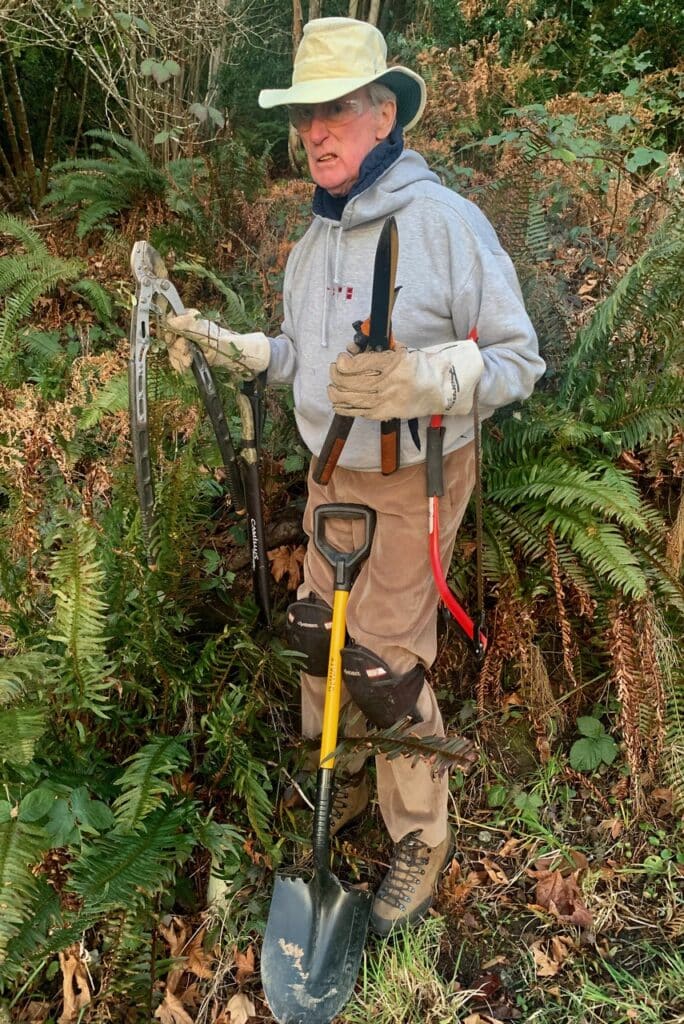Columns Community
One man’s private war against Scotch broom and blackberries
I pride myself in being a peaceful person, yet I expend much of my time and energy as a Gig Harbor property owner fighting an all-out war.
Possibly you soldier in a similar conflict. My enemies list may vary somewhat from yours, but it’s a fair bet that, somewhere on your list, we share the tough, belligerent, clever, persistent and damnable combatants that top mine.
Scotch broom and blackberries.
Don’t get me wrong. I yield to no one in my delight each spring at the brilliant, seemingly sun-fueled flowers of the Broom. And don’t get between me and the dessert table if it features a blackberry pie or cobbler.
But NIMBY. Not in my backyard, baby.
My backyard, I should explain, is actually my front yard, an acre of steep, largely untamed, downhill slope, a tossed salad of ferns, salal, bushes and grasses, dressed by towering firs, sturdy madrones, scraggly maples, prickly hollys, with a few stumps scattered about like crunchy croutons.

The author, equipped and outfitted for combat against Scotch broom and blackberries.
Those gray, decaying stumps are, of course, evidence of warriors past, fighting on this same battleground for profit or, more likely, view protection.
My enemies are sneaky, wind borne, soil born, apparently genetically trained from an early age to mingle innocently and unobserved under the shelter of more tolerable growth.
Then, encouraged by spring rain and sunshine, they shed their camouflage, get themselves up on their roots and sprout fully. Seemingly overnight, they mature into eager conscripts forming legions ready to sally forth boldly into battle.
Oh. About those roots.
Any experienced Gig Harborites who have made it to this point in this rant are probably thinking, “This guy”s crazy! Pulling plants from the soil on a hillside below his house?”
Without denying the entirety of your diagnosis, I will defend myself.
I am aware, of course, that those roots and their tendril webs are part of the rebar reinforcing my lot and that my lot anchors my home.
I have a considered and considerable personal and financial interest in keeping my house in place. Not only is it where I eat, sleep, and … whatever, I love the sweeping Gig Harbor view it provides.
Furthermore, should the slope give way, my lot would slide into the higher property tax rate suffered by my waterfront neighbors below. Who would want that?
Not to mention that the aforesaid neighbors might be a bit peeved. Could make for awkward moments at neighborhood potluck dinners.
So I judge root removal on a case-by-case basis. Sure, it’s a time-consuming process and likely to prolong the war, but the situation demands it.
I find it hard to respect a Scotch Broom root. The taproot on a one-to-three-foot plant resembles a foot-or-more-long, whitish, already spindly carrot needlessly taking Ozempic. Usually, its thread-like, wimpy tendrils fold down without so much as a whimper or fight.
An easy pull. Even a slight tug from a tottering old man often can do the trick. (Do not ask how I know about tottering old men.)
Undisturbed for years, Scotch Broom can reach 12 feet high and become a lot tougher to convert to a KIA. Imagine the horror.
Furthermore, each Scotch Broom carries silent, unseen weapons. Allowed to bloom and go to seed, it plants scads of land mines, toxic, mischievous, fertile seeds, some of which may lie dormant for decades, sleeper cells ready to attack when triggered by an unseen, malevolent high command.
My fellow soldiers, one reason I lack respect for the broom is that it foolishly gives away its position each spring by carelessly waving its bright yellow battle flag.
Stay vigilant, comrades! Keep a sharp lookout!
See something? Slay something!!
Now blackberry? There’s a plant with a root for any military strategist to respect: Strong, gnarly, intricate, thorn-armored, with a formidable underground network any band of insurgents would want to emulate.
Blackberry has mastered expansionist techniques that are surely the envy of certain politicians.
Dense root balls the size of potatoes send out multiple exploratory patrols in all directions under the soil. Above ground, sprays of thick, sturdy branches and stealthy, flimsy stringers reach out over impressive distances before dipping their growing tips back into the soil to establish new root outposts far from their headquarters.
When it comes to preserving my lot and home, Broom’s skinny root re-bar powers pale in comparison to those of blackberry’s intricate, extensive macrame above and below the soil. Weapons selection and tactics become crucial. Even garbed with standard issue welder’s gloves, pulling up seems impossible or ill-advised.
With the high stakes consequences in mind, a solitary soldier must be decisive on the battlefield.
In my Sergeant York moment, do I whack away with my machete? Clip with my long blade shears? Snip with my ratcheted clippers? Wield a shovel to get at the ball itself?
War is hell.
Then, at the end of a day’s battle, deceased enemy troops litter the slope. No one claims them.
The state regards the corpses as “invasive species.” Short of paying a fat garbage disposal fee, the Purdy recycling center folks won’t take them, fearful of polluting the precious mulch they grind out of less reviled plant life. My commanding general does not allow stacks of detritus to mar her home’s landscape.
What to do?
Anyone out there have any tasty recipes for sliced invasive with all the trimmings?
I didn’t think so.
The war drags on.
Former journalist and yacht broker Day, an occasional contributor to Gig Harbor Now, lives in Gig Harbor with his wife Janet.
